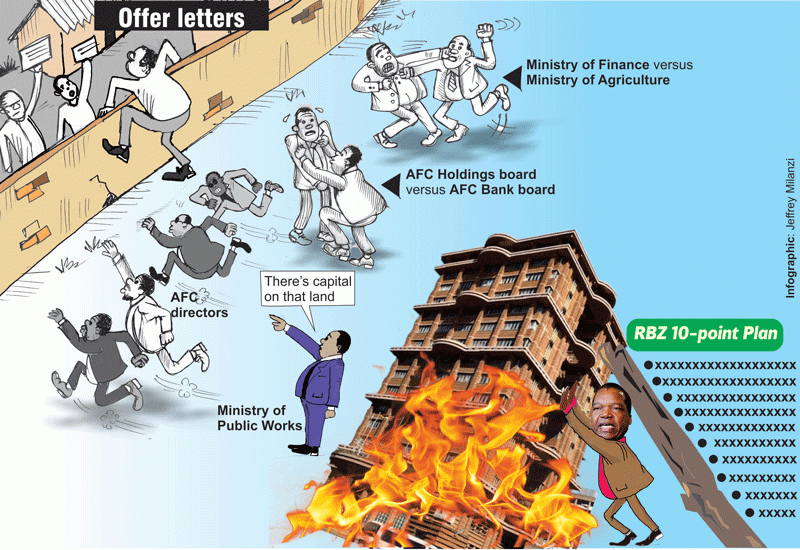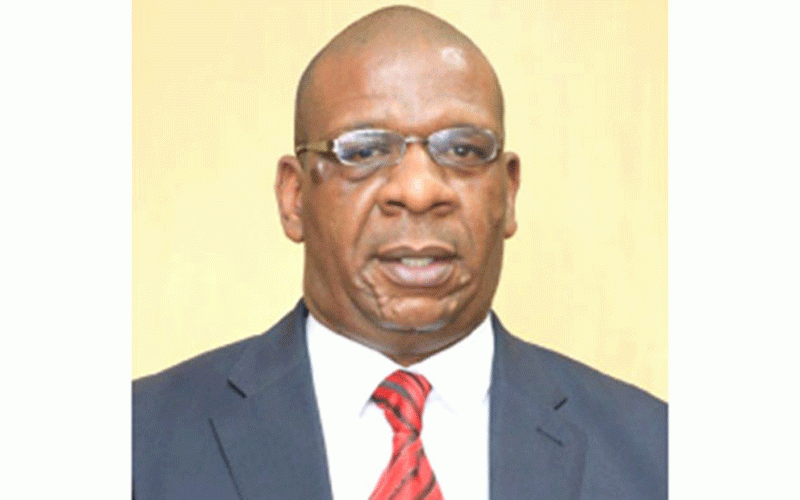
INFIGHTING at Zimbabwe’s newest banking empire, AFC Holdings (AFCH) could de-stabilise its flagship AFC Bank before spreading across the entire financial system, a confidential central bank report revealed this week.
AFCH entered Zimbabwe’s banking landscape about a year ago, following the transformation of state-run agricultural lender, Agribank, into a broad financial services outfit that now superintends over AFC Land and Development Bank, AFC Commercial Bank, AFC Leasing Company and AFC Insurance Company.
Government controls 100% shareholding in the business through the ministries of Finance and Agriculture, which each holds a 50% stake.
The central bank exposes how the massive empire kicked off on shaky ground from its launch in 2021, with little capital and state undertakings to parcel out substantial pieces of prime land to bolster its asset base.
AFCH’s troubles have been compounded by state interference, according to the Reserve Bank of Zimbabwe (RBZ), which slapped the banking group with a corrective order on March 8, following an onsite examination in October.
The state’s tight grip on its mostly insolvent businesses has been a source of grave concern for decades. But analysts say government has over-stretched its appetite to micro-manage businesses by trying to run delicate sectors like the banks behind the scenes.
The RBZ exposed how disagreements between AFC Bank’s directors and the holding company had frustrated growth, with four AFC Bank non-executive directors being sacked by the Ministry of Agriculture without consulting the Ministry of Finance.
But the central bank specifically zeroed in on potentially dire sector-wide implications of AFCH’s destabilisation, and proffered insights into what the endgame could be.
- Letter to my people: Mthuli Ncube is mounting a dead horse
- Arbitration insights: The origins of commercial arbitration
- News in depth: Mnangagwa administration elbows out British investor under a cloud
- Letter to my people: Mthuli Ncube is mounting a dead horse
Keep Reading
Concerns over banking sector crises have been brewing within central bank chiefs worldwide since the collapse of United States-based Silicon Valley Bank last month, which saw policymakers scrambling to stem deadly contagion.
Last month, Swiss authorities were forced to orchestrate the emergency takeover of Credit Suisse by its larger rival UBS, granting huge government guarantees in order to prevent a catastrophic banking collapse, in a deal that shocked the banking world.
“These issues pose a threat to the stability of the group (AFCH) and the financial system at large,” the RBZ said in its nine-page corrective order.
“The examination established that there is lack of board cohesion, disharmony on the boards, deep seated mistrust, perceived resistance and instances of accusations and counter-accusations among board members of AFC Holding Company and AFC Commercial Bank.”
AFC Bank directors’ sackings have been kept under wraps for many months.
But the central bank hints that the lender could be at the mess of a legal tussle should they decide to seek justice in the courts.
It said its inspection had found no evidence of wrongdoing or ‘impropriety’ when they the four were asked to leave after querying some decisions.
At the time of the strongly-worded corrective order, AFC Bank had failed to reach the regulator-prescribed US$30 million capital benchmarks. But prospects for bolstering its capital base to US$30 million were in jeopardy.
Its board and executive had hit a dead-end as they attempted to monetise the land allocated by government. Individuals and corporations, holding state-issued offer letters also laid claim to the land, and the central bank feared this could be a source of an explosion of legal tussles and damaging reputational risks for the operation.
Mazowe Rural District Council had already sold the land that AFCH had been allocated to private developers and used the money,according to an inventory sent to the Ministry of Agriculture by AFCH chief executive officer Francis Macheka.

The Zimbabwe Independent can report that the entire operation is now under the central bank’s radar, with directors compelled to update policy-makers on the 10–point corrective order’s progress until June 30.
“There were reports of strained working arrangements between the group’s board and commercial bank board, which led to the calling of four board members of AFC Commercial Bank,” the RBZ said in its corrective order.
“The targeted on-site examination established that the condition of AFC Commercial Bank had progressively weakened with low prospects of bolstering (the) financial condition in the short to medium term in the absence of urgent intervention.
“The core of the challenges were unsound corporate governance practices, persistent crucial under-capitalisation, sub-optimal earnings performance, inadequate management information systems and heightened reputational risk,” the central bank noted.
It slammed government interference in AFCH’s operations and warned that crucial decisions should be made after shareholder consultations.
“There was no evidence that the process where four non-executive directors were recalled by the Ministry of Agriculture…had the consideration of the other 50% shareholder, Ministry of Finance and Economic Development,” the central bank stated.
“There was no evidence of due process having been followed and this includes requisite board resolutions and the affected board members’ rights to be heard. It was noted that the recall was not supported by findings of inappropriate conduct or impropriety on the part of the said directors, thus exposing the institution to potential legal risk where the affected directors could raise issues of victimisation, and thus raise reputational risk. Recalling of independent board members is a supervisory concern given the fact that independent non-executive directors are regarded as important to corporate success as they provide independent thinking, which provides balance to the board discussions,” the RBZ added.
The central bank said the holding company, which has an important national mandate for agrarian transformation, commenced operations without adequate funding and capitalisation, resulting in its huge reliance on the commercial bank for its operational expenditure.
“The group received land from the shareholder towards re-capitalisation of the group and its subsidiaries,” RBZ said.
“However, the banking institution’s capacity to underwrite business remains constrained, underscoring the need for strategies to enhance the institution’s underwriting capacity in order to achieve its mandate.”
In his report to the Ministry of Agriculture, titled Update on Various Farms Allocated to AFC Holdings Limited to the Ministry of Local Government and Public Works dated March 31 2023, Macheka disclosed that gaining access to AFCH’s landbanks could be difficult. AFC did not respond to questions sent the Independent.
“Some of the properties (like) Mazowe Cartref Farm are already settled,” Macheka said.
“There might not be any possibility of monetisation of the properties. AFC Holdings received a report from Mazowe RDC (rural district council) that…Cartref Farm was subdivided and all the stands have been sold.
“The report also states that the developers have paid for compensation of the land and the RDC utilised the money. This implies that there is not any monetary value that can be realised from Cartref Farm,” he said in the report,.
AFCH has until June 30 to submit a series of remedial actions to the RBZ, as it battles to ‘protect the interest of…depositors, the integrity and stability of the group and the financial system at large. The RBZ said in its report: “In the event of AFC Holdings failing to comply…the RBZ will…levy a daily penalty for each day that the group remains non-compliant.”











